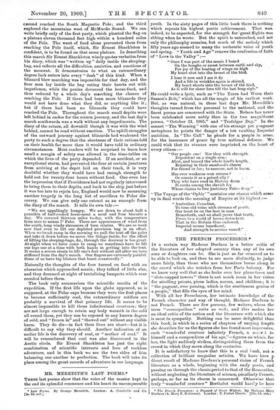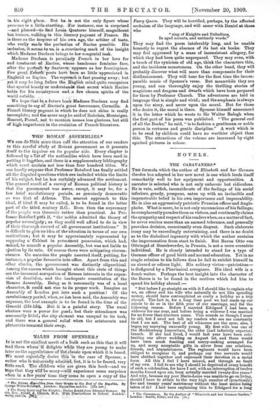THE FRENCH PROCESSION.*
IN a certain way Madame Duclaux is 'a better critic of the literature of her adopted country than any of its own
sons or daughters can be. She is just so far 'removed as to be able to look on, and thus to see more distinctly, to judge more fairly, than those who are themselves borne along in the crowd which she watches from her Paris balcony. For we know very well that as she looks over her plane-trees and "slate-capped towers" there is not much room in her vision for strolling priests, pious ladies, nurses, and children ; it is "the pageant, ever passing, which is the continuous genius of a people," that fills the eyes of her mind.
With all her Frenchness, her intimate knawledge of the French character and way of thought, Madame Duclaux• is not French. There are few persons, few writers, whom the term " cosmopolitan " suits so well ; and this makes her an ideal critic of the nation and the literature with which she is most in sympathy. Nothing can be more delightful than this book, in which in a series of chapters of varying length,
she describes for us the figures-she has found most impressive, each "wonderful creature infinitely French, a rnarw:l in himself and a compendium of his age,"--figures on which, for her, the light suddenly strikes, distinguishing them from the- crowd in which they move along the centuries. ,
It is satisfactory to know that this 18.a real book, not a
collection of brilliant magazine articles. We have here 2. direct result of Madame Duclaux's personal Vlsion of Frenell literature as a whole, beginning with the • early poets, and passing on through the classic period to that of the Romantics, without neglecting the literature of science, peculiarly French, perhaps, so far as its charm is concerned. Otherwise that truly "wonderful creature' Berthelot would hardly be here
• The French Processio n: a niosanS of Great Writeri. Madame Mary Duels= (A. Mary F. Robinson). London : T. Fisher Unvrin. Lteo. ed. meta in his right place, But he is not the only figure whose presence is a little startling. For instance, one is surprised —and pleased—to find Louis; Quatorze himself, magnificent but human, walking in this literary pageant of France. He is there as the inspirer of his,: own age, the arbiter of taste, who really =Ade the perfection of Racine possible. His inclusion, it seems; to us, is a. oonvinoing mark of the insight which Madame Duclaux brings to her congenial task, Madame Duclans is peculiarly French in her love for and treatment. et Racine, wheat). 'handsome feminine face, after the porkraft: by SanterrerapPears as her frontispiece. Few great _FArtillt" poets hare been so little -appreciated in _nglanil as Ratein.e. The repri5rieh is fast passing away; but yet it maybe long , before the phiosh mind quite recognises that special be -salty or understencle. that secret which Racine beide for his countrymen. and. ,a few chosen spirits of the
world outside. , .
We hope that in a future beolr-Madame Duclaux may find something to say dfi Racine's: great forerunner, Corneille. A. French literary pageant in which he does not shine is really incomplete; and the tame mayke said of Rabelais, Montaigne, Boesuet, Pascal,, not to mention names less glorious, but still of high importance in the evolution of French'literature.

























































 Previous page
Previous page